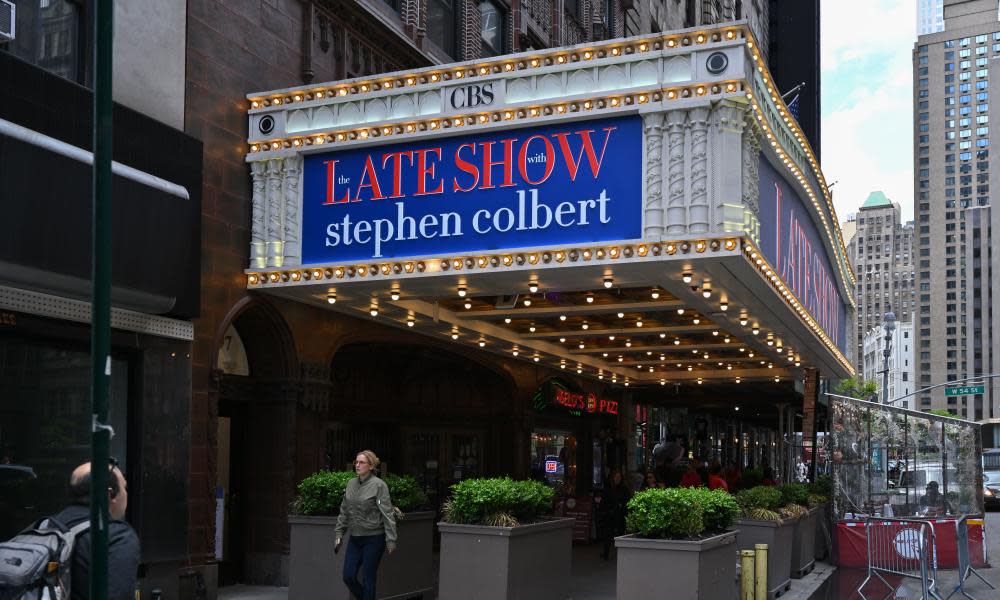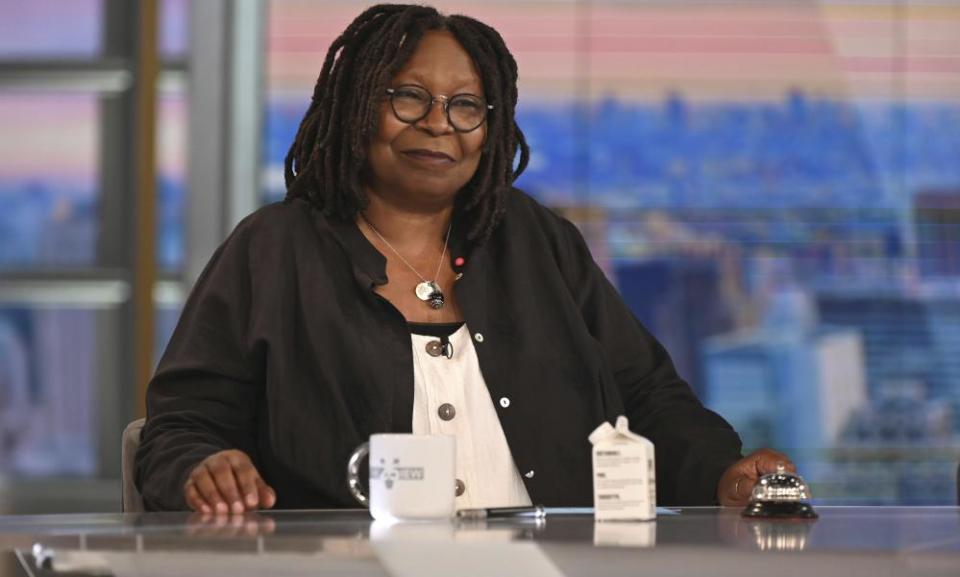Writers strike: how has it immediately affected the TV industry?

At 12.01am PT on Tuesday morning, the Writers Guild of America (WGA) called on its 11,500 members to go on strike. By Tuesday afternoon, many were on picket lines outside major studios in New York and Los Angeles, and the impact of a work stoppage over compensation, streaming-based residuals, minimum staffing guidelines and other concerns cascaded through Hollywood – though, given the timing, the proliferation of streaming, and the ability of studios to bank episodes ahead of time, it’s unclear how many people will notice.
Related: ‘Pens down!’: Hollywood writers strike as late-night comedy shows go dark
At the frontline of impact were late-night variety shows, which rely on writers to craft topical jokes based on up-to-the-minute headlines. On Tuesday, CBS’s The Late Show with Stephen Colbert, ABC’s Jimmy Kimmel Live!, NBC’s The Tonight Show with Jimmy Fallon and Late Night with Seth Meyers all halted production and will air reruns during a strike that could potentially last several weeks. (The last writers strike 15 years ago stretched for 100 days, from November 2007 until February 2008.) HBO paused production on the weekly shows Real Time with Bill Maher and Last Week Tonight with John Oliver.
Comedy Central’s The Daily Show, in the middle of a guest-host run by longtime contributor Dulcé Sloan as part of a rotating audition to replace Trevor Noah, also switched to reruns. And NBC’s Saturday Night Live, which had three episodes left in its 48th season, announced a production shutdown on Tuesday afternoon, beginning with former cast member Pete Davidson’s hosting debut this Saturday.
It’s not unfamiliar terrain for many of the late-night brethren, who have developed a friendlier camaraderie compared to the more cutthroat ratings wars of the 90s and 2000s, particularly after the mutual upheaval and uncharted terrain of the pandemic. (Several filmed a farewell segment for the Late Late Show’s James Corden, who conveniently ended his eight-year run last week.) In recent weeks, late-night hosts and top producers have been on group calls developing a coordinated response in anticipation of a strike, which several hosts have experienced before.
In 2007, Colbert’s Comedy Central program, The Colbert Report, went dark for two months, then returned without writers to protect non-striking staff. To show respect for striking writers, they rebranded as The Colbert Report (hard t’s). (The Daily Show with Jon Stewart did the same, returning as A Daily Show.) Kimmel paid his staff out of pocket – as did David Letterman, Conan O’Brien and Jay Leno – and later said he returned to air because he nearly drained his life savings.
Meyers, who was on the picket line with SNL writers in 2007, expressed support for writers during his final monologue before the strike on Monday evening. “No one is entitled to a job in show business, but for those who have a job in show business, they are entitled to fair compensation. They’re entitled to make a living,” he said. “I think it’s a very reasonable demand that’s being set out by the Guild, and I support those demands.”
Colbert likewise dedicated a segment of his final show to his writers, with cheeky “future news jokes now” ahead of a likely strike. “Without these people, this show would be called The Late Show With a Guy Rambling About Lord of the Rings and Boats for an Hour,” he joked. The host also expressed his support for the writers’ demands, as a member of the Guild himself. “The writers’ demands are not unreasonable,” he said. “I support collective bargaining. This nation owes so much to unions.”
Asked about the strike on Monday’s Met Gala, Jimmy Fallon, who began hosting The Tonight Show in 2014, said: “I wouldn’t have a show if it wasn’t for my writers, I support them all the way.” Although, according to one of his own non-Guild staffers, that support did not extend to a meeting on Tuesday morning in which Tonight Show staff learned they wouldn’t be paid after this week. (In contrast, Meyers was reportedly in a Zoom meeting on Tuesday trying to help non-striking staff handle a payment pause by NBC.) Deadline reported that, as of Wednesday morning, both Fallon and Meyers will pay their staff for two extra weeks after NBC stops.
The daytime talkshow landscape is more complicated, as some shows, particularly those which rely more on loose interviews, don’t hire Guild writers. CBS’s The Talk is the only major daytime program to fully pause production. As it did in 2007, The View will carry on, though without its few WGA scribes. “You’re going to hear how it will be when it’s not, you know, slicked up,” said co-host Whoopi Goldberg on Tuesday morning, during the noticeably less polished broadcast; at one point, Goldberg turned directly to executive producer Brian Teta to ask what the next topic of discussion was. “We’re thrilled you watched us. We hope you weren’t too freaked out about the fact that we have no writers,” she said at the end of the broadcast. “But we did the show anyway because we want to keep everybody employed and we want to do our best and we support our writers because we know what they’re going through.”

Disney’s syndicated morning show Live With Kelly and Mark as well as ABC’s Tamron Hall are unaffected by the strike and aired as usual on Tuesday morning. NBCUniversal’s The Kelly Clarkson Show does employ some Guild writers, but has several episodes banked ahead of time, including the one run on Tuesday. The Drew Barrymore Show, distributed by CBS, has already wrapped production on its season.
The impact on scripted television depends on how long the strike lasts. It has already paused several writers’ rooms, including Yellowjackets, Abbott Elementary and Cobra Kai (scripts for the second season of HBO’s House of the Dragon have been turned in). The strike will disrupt promotional efforts for new series such as Davidson’s Bupkis, but it would need to go on for months to significantly alter release dates, though it could shorten seasons. “We are a show that writes while we air,” the Abbott Elementary writer Brittani Nichols told Variety. “If this strike goes on for a significant period of time, our show will not come out on time and that could change the amount of episodes which I’m sure people will be very upset about.” In the meantime, viewers can expect to see renewed investment in unscripted series, as in strikes past, such as Peacock’s newly announced series Sex in the Dark.
On the film side, studios have braced for a possible strike for months, and have numerous movies currently in production (without scribes on set) through at least 30 June, when contracts expire with the actors’ and directors’ unions, as well as many more in post-production. With numerous screenplays already locked and in various stages of pre-production, there will be little tangible effect of the strike on the theatrical calendar; according to Deadline, the strike would need to last at least four months for studios to push their release dates.
The studio and streaming cushion evinces an issue for the WGA’s efforts this go-round: will audiences notice? The 2007 strike occurred at the beginning of the network television season, in the just-before-streaming era when audience viewing patterns would be disrupted by the pause of popular shows such as 30 Rock, The Office or Heroes. This time, the streaming services, from whom writers are seeking better pay minimums and protections against the gig-ification of their work, have many, many series in the bank – a record 599 original English-language scripted shows aired in 2022, more than any person can watch. Late-night shows have weathered shrinking ratings and ad revenue for years, and has contracted significantly since last spring (James Corden, Trevor Noah, Samantha Bee and Desus & Mero have all exited the field; only The Daily Show will find a replacement.)
TV fans of all stripes will notice if the strike goes on long enough, but that may be longer than anyone is comfortable going. The impact on several shows, and thus many people’s livelihoods, was immediate on Tuesday. But whether or not that courts the same level of public pressure and attention as in strikes past will be, as with the fraught negotiation, a game of wait and see.

 Yahoo News
Yahoo News 
